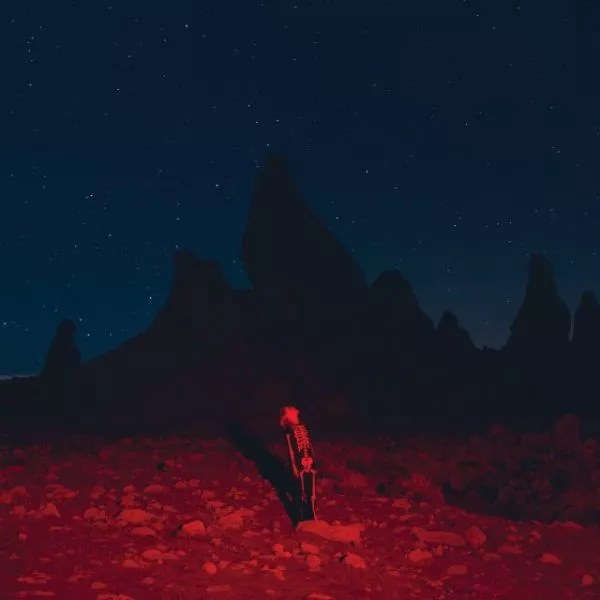Phoebe Bridgers makes the kind of music best suited for sad self-indulgence, satiating a near-masochistic craving for loneliness. The soft-spoken specificity of her 2017 debut Stranger in the Alps charmed its listeners with eerie emo-folk tales of inescapable blueness. Now, with her 2020 follow-up Punisher, Bridgers casts the same spell with new lyrics, crafting a fresh sense of isolation that cuts deep in quarantine.
The album comes a day earlier than expected. Originally scheduled to arrive on June 19th, Bridgers shared a link to the new songs on Twitter with the words “I’m not pushing the record until things go back to ‘normal’ because I don’t think they should.” Her choice to forego the original release date, also the holiday Juneteenth, comes at a time when activists on social media have called for all industries to make more space for Black voices.
Despite the climate of social unrest surrounding Bridgers’ latest record, the songs themselves remain largely uncontroversial. Bridgers’ ghostly voice carries us through narratives that feel familiar — stories of failed relationships and mental health struggles encapsulated in memories of hopping fences or visits to homeopathic doctors like those in “Garden Song,” the record’s first single.
The new album is in fact so tethered to its predecessor that the opening track “DVD Menu” actually samples the closing track from Stranger in the Alps. Still, there is an undercurrent of newness—whether it be new depression, new hope, or something in between. “I don’t know how but I’m taller,” Bridgers croons on “Garden Song” before lifting us to the uptempo earworm “Kyoto.”
But the fanfare rhythms don’t stick around for long. The title track that follows is a sort of ode to Elliott Smith, a long-time favorite of Bridgers’. She channels his work with double-tracked vocals, and splices in a reference to his song “Son of Sam” with the lyric “a copycat killer with a chemical cut.” The question of the chorus is a contemplation on first impressions — an anxious overthinking of the overthinking that occurs when we meet our heroes.
The double-tracking she uses on “Punisher” subtly finds its way into other tracks on the album as well, making her vocals so haunting that every word is charged with a tragic mystery. Every image she conjures appears as a somber colorless scene, even if all she does is “run the tap ‘til it’s clear” on “Savior Complex.” And on “Halloween,” the mentions of masks and sounds of sirens now hold a darker implication, even if the words weren’t initially written amidst the rampant death of a pandemic.
Bridgers pokes fun at these overindulgences in imagery, too. Bemoaning the lack of stars one night, she “wished hard on a Chinese satellite,” admitting to feeling nothing when she looked at the sky. The opening lyrics of that same song are a couplet that reveals the uncomfortable self-awareness of the album: “I’ve been running around in circles / pretending to be myself.”
We submit ourselves to her songs as Bridgers submits herself to the characters within them. The final chorus of “Graceland Too” leads with the phrase “I would do anything you want me to,” masking desperation with devotion. “Savior Complex” holds another irresistibly seductive self-sabotage, with Bridgers whisper-singing “You want blood and I promised.”
Where Bridgers’ self-examination intensifies on Punisher, so does her instrumentation. The album is notably more collaborative than Stranger in the Alps was, featuring her former bandmates from boygenius and Better Oblivion Community Center as well as Yeah Yeah Yeahs guitarist Nick Zinner and Fiona Apple’s bassist Sebastian Steinberg, to name a few.
The chugging rhythms certainly breathe life into “Kyoto” and “Chinese Satellite,” but they also spell disaster in the final track. Bridgers’ brief experiment with group vocals and screamed angst goes awry, spoiling the lyrics that precede it with a corny buildup that goes nowhere.
It’s not a fatal flaw, but it ruins any circularity the album might have had. The end doesn’t easily reach back toward the beginning, interrupting the tragically romantic daydreams Punisher provokes with a cacophonous wakeup call.
Listening to Punisher is like listening to Stranger in the Alps in that both are a practice in secondhand self-delusion. The intimate specificity of Bridgers’ words invites us to live vicariously through them. We inject ourselves into the memories she sings of—stories that we simultaneously relish and fear—until they dangerously merge with our own. We drown ourselves in her words until we are dazed by an inextricable cocktail of pain and pleasure, forgetting who we are until the album ends and we are forced to once again confront our own dismal realities. — SOPHIE BURKHOLDER

